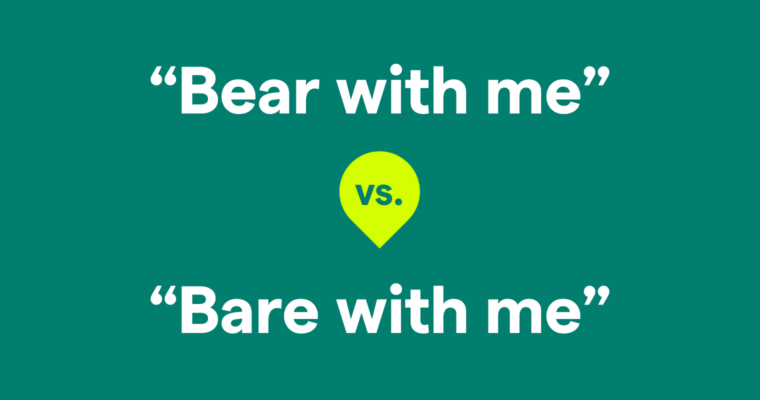
- “Bear with me” is the correct way to say “Be patient with me.” “Bare with me” translates to “uncover with me” and is an incorrect way to spell this phrase.
- “Bear with me” is a common phrase used to politely request someone’s patience or understanding while you finish a task, deal with a situation, complete a thought, or wait for a response.
- Other ways to say “bear with me” include “Please hold on for a moment,” “Please be patient,” “Thank you for your patience,” and “Please stand by.”
Requesting someone’s patience is common in both formal and informal settings. Although people often confuse “bear with me” and “bare with me” when asking someone to be patient with them, it’s important to know which one to use, especially in professional settings. Here, we’ll discuss what “bear with me” means and its spelling to ensure you use it correctly in your writing.
Table of contents
“Bear with me” vs. “bare with me”
How to remember the spelling of “bear with me”
Other variations of “bear with me”
Examples of “bear with me” used correctly
“Bear with me” vs. “bare with me” FAQs
“Bear with me” meaning
“Bear with me” is a commonly used phrase that means “be patient with me” or “have patience with me.” The verb bear means “to endure or to be patient” or “to carry the weight of or support.” “Bear with me” politely requests someone’s patience or understanding while you finish a task, deal with a situation, complete a thought, or wait for a response. When used professionally, “bear with me” can help strike a formal, cordial tone that acknowledges the recipient’s time spent waiting for you.
The phrase “bear with me” comes from the Old English word beran, which means “to carry or support.” It evolved to suggest enduring or being patient with someone, and its usage has been common in English since at least the 16th century.
“Bear with me” can be a standalone phrase if its reason is already apparent, or it can be used with a conjunction like as, while, or for.
You can also formulate “bear with me” into a question to further emphasize that you’re requesting someone’s patience.
To make the phrase plural, when you represent a group of people or an organization, you can say “bear with us.”
“Please bear with me”
“Bear with me” is often used with please to sound more polite and respectful. “Please bear with me” has the same meaning as “bear with me” but may be more appropriate in professional settings.
“Bear with me” vs. “bare with me”
“Bear with me” is the correct way to say “be patient with me.” Bare and bear are homophones (words pronounced the same way but with different meanings). Because these words sound similar, it’s easy to see why they are commonly confused when used in the phrase “bear with me.”
What does “bare with me” mean?
“Bare with me” translates to “uncover with me.” The verb form of bare means “to reveal or uncover (a part of the body or other thing) and expose it to view.” You’ve probably encountered bare as a verb in phrases like “bare your soul,” “bare the weight of,” or “bare one’s teeth.” When used before “with me,” its meaning becomes confusing in writing.
How to spell “bear with me”
The correct spelling is “bear with me,” not “bare with me.” When asking someone to be patient with you, use “bear with me.”
Although “bear with me” and “bare with me” sound the same when spoken, it’s essential to spell the phrase correctly when using it as a written request.
Is it “bear in mind” or “bare in mind”?
The correct phrase is “bear in mind.” It means “to remember or consider something when making a decision or evaluation.” “Bare in mind” is incorrect in this context.
Is it bearly or barely?
The correct word is barely. It means “to only just manage to do something or to hardly have enough of something.” Bearly is not a standard word in English.
How to remember the spelling of “bear with me”
Here’s an easy way to differentiate “bear with me” from “bare with me.” You learned that bear as a verb means “to be patient.” In its noun form, bear refers to a large, furry animal. Think of a grizzly bear enduring a long winter in hibernation as a helpful way to remind yourself that “bear with me” refers to enduring something patiently.
All other instances that do not refer to enduring something patiently would require the word bare.
Other variations of “bear with me”
Here are the verb tenses of “bear with me” and some synonyms of the phrase.
Verb tenses of “bear with me”
The simple present tense indicates that an action happens regularly or unceasingly, which is why it’s sometimes called present indefinite.
- You/they bear with me.
- He/she/it bears with me.
The present continuous tense indicates that an action or a condition is happening now, is occurring frequently, and may continue into the future.
- You/they are bearing with me.
- He/she/it is bearing with me.
The present perfect tense is used for past actions related to or continuing into the present.
- You/they have borne with me.
- He/she/it has borne with me.
The simple past tense is used to talk about things that happened or existed before now.
- You/they/he/she/it bore with me.
The past continuous tense, also known as the past progressive tense, describes ongoing actions in the past.
- She/he/it was bearing with you.
- You/they were bearing with me.
The past perfect tense, also called the pluperfect, is used to talk about something that happened before something else that is also in the past.
- You/he/she/they/it had borne with me.
The simple future tense helps convey an action or a state that will begin and end in the future.
- You/he/she/they/it will bear with me.
The future continuous tense shows an action that will occur over a period of time in the future.
- You/he/she/they/it will be bearing with me.
The future perfect tense is used for actions that will be completed before some other point in the future.
- You/he/she/they/it will have borne with me.
“Bear with me” synonyms
There are many other ways to say “bear with me” formally and informally. The appropriateness of using this phrase and its synonyms depends on the formality of your situation and the tone with which you deliver it. Here are some other ways to say “bear with me.”
Formal ways to say “bear with me”:
- Please hold on for a moment.
- Please be patient.
- Just a moment.
- Thank you for your patience.
- Please stand by.
- Please wait.
Informal ways to say “bear with me”:
- Give me a moment/minute/second.
- Can you put up with me for a moment?
- Hang on.
- Hang tight.
- Stick with me.
- Just a minute.
Examples of “bear with me” used correctly
Here are some more examples that use “bear with me” correctly.
“Bear with me” vs. “bare with me” FAQs
What does “bear with me” mean?
“Bear with me” means “be patient with me” or “have patience with me” while you work through something or deal with a situation. It’s a way to request understanding and tolerance as you navigate a delay or a challenge.
Is “bear with me” or “bare with me” correct?
“Bear with me” is the correct spelling of the phrase. “Bare with me” means “uncover with me” and is incorrect to use when requesting someone’s patience.
What are some other ways to say “bear with me”?
- Please hold on for a moment.
- Please stand by.
- Thank you for your patience.
- Give me a moment/minute/second.
- Just a minute please.






